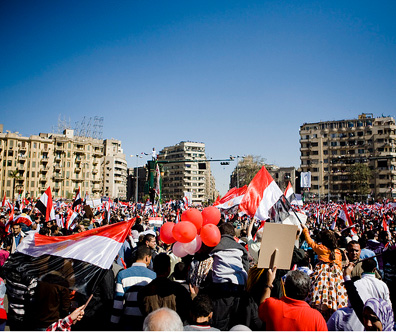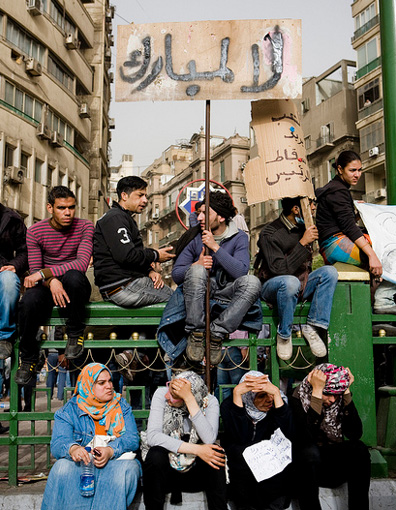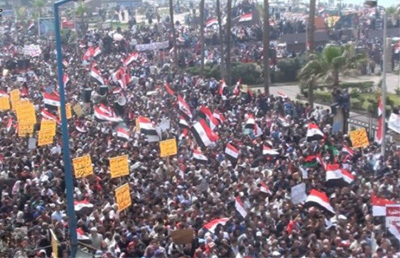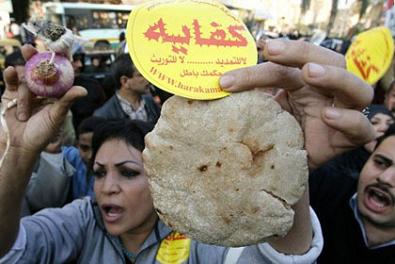The Arab revolutions are presenting the Left with a mixture of existential challenges and historical opportunities. The decisive factor will be the Left’s ability to learn from the rich lessons of its own past experiences and vast revolutionary legacy, in order to develop its own project and role in the coming period, and to work out a coherent plan for tackling challenges ahead. May that be an occasion for the Left to move away from its penchant for lacerating self-criticism, as if there is no end to paying penance for past sins, and to embrace instead a study of the past that contributes to a better understanding of the Left’s current position and role, especially in preparation for the tasks of the coming period. This also presupposes that there are elements within the Left who are ready to transcend two currents still active in their midst: a leftist current that continues to support despotic regimes on the pretext of giving priority to the “national question” and a leftist current that is counting on external intervention for paving the way to democracy.

Uprisings Against Neoliberalism
The slogan “the people want to topple the regime,” which moved tens of millions of Arabs from the Atlantic Ocean to the Gulf throughout 2011, and is still moving them to various kinds of sacrifices, is the distinguishing mark of the democratic nature of the uprisings and their most radical objective. The slogan declares that the people are the source of power and elevates popular sovereignty above every other sovereignty, be it individual, dynastic, party-based, military-based, or based on religious authority. It declares that the existing Arab regimes are unable to reform themselves by themselves, and affirms that the only path to the realization of the will of the people is to change them by force – the force of the people.
Alongside the slogan “the people want,” a complementary and no less popular slogan was also raised: “work, freedom, bread,” which put the right to work and social justice at the heart of the democratic process. What was new about this slogan was the demand for “work.” It points to unemployment as one of the primary motivations for the uprisings and as the decisive instigator of the participation of the youth in the uprisings. It is a well-known fact that the Arab world has the largest percentage of youth among the population (eighteen to twenty-four years of age), the largest percentage of unemployed (no less than thirty per cent), and the largest percentage of unemployment among the youth (forty-four per cent of the unemployed). Youth unemployment points to the increasingly rentierist character of the Arab economies subject to the dictates of neoliberalism in the globalized capitalist order. Nothing is more indicative of the scandalous nature of these dictates than the fact that the directors of the International Monetary Fund and the World Bank hastened to admit – in the face of the Tunisian and Egyptian revolutions – that the growth of local production does not adequately respond to the problem of unemployment, even though that was the measure the two institutions had imposed for a quarter century as the main measure of economic improvement!
The scandal grows even more in view of two facts: first, that the two institutions, whose stated mission is to oversee the economic and financial well-being of the world population, had been promoting Tunisia and Egypt as paragons of economic success in the wake of the “structural reforms” they had enacted; and second, that fifty-one million more jobs will be needed in the Arab world by 2020, according to estimates of the United Nations Development Agency from 2009. What economies can produce jobs in such numbers? And what challenge for the Arab revolutions, and for those who will govern in their names, is greater than this challenge? It is a challenge that will be all the more insuperable if these revolutions are limited to the political sphere.
The truth of the matter is that the uprisings are a popular collective movement of opposition against neoliberalism, more than a quarter century after it was directly applied in the region. This is one of the factors that explain their occurrence in so many Arab countries at the same time.
There is no separation here between the social and political motivations. The application of the neoliberal economic policies was accompanied by growing concentration of power and wealth in the hands of mafia-like groups and families, invariably connected with security state apparatuses, which extorted special benefits from the financial-real-estate-contracting sectors. This was the case under both the military dictatorial regimes and the dynastic rentier regimes ruling the oil economies. It certainly was no coincidence that this mating of despotism and neoliberalism led to the predominance of the repressive arm of the state over any other state function as a primary means of social and political control. That is a shared characteristic of the regimes of countries where the dictates of the World Bank and the IMF were applied. The concentration of wealth and the abandoning of any serious developmental effort, coupled with an increase in deprivation and poverty, led to the growth of waste and plunder of public finances. Thus, instead of being invested in regional productive projects, oil and gas revenues were (and continue to be) re-exported to the capitalist centres where they are used to finance the European and American debts, to support their currencies, and promote their investment in various sectors unrelated to regional well-being – that is, when the petrodollars were not being wasted by the billions in the financing of Gulf wars, in contracting billion-dollar weapons sales, and in purchasing obscene luxury goods.
The scandals of the deposed Arab leaders, and the tens and hundreds of billions of dollars that they had accumulated, have exposed the savagery with which they exploited political power to enrich themselves. They plundered public finances, took commissions on economic projects, appropriated large shares of the oil revenues, and controlled the sovereign wealth funds, not to mention the smuggling and laundering of money. All this was done at times when campaigns against “corruption” turned a blind eye on scandals and plunder. Privatization was promoted on the pretext of trimming fat off governmental bureaucracies. “Balanced budgets” were an excuse to give tax breaks to businessmen and rich people, and to increase the burden on the public through indirect taxes, while policies of “austerity” put an end to government subsidies of goods and basic staples and reduced to a minimum the role of the state in social distribution and welfare.
Democracy is the Path to Socialism
These are some of the repercussions of the Arab world’s encounter with globalization, and these are the challenges of its popular revolutions. The Left, if it is to remain relevant in the eyes of the masses whose basic interests it purports to represent, must completely re-think its social project and recuperate its intellectual independence as a necessary condition for organizational and political independence.
And lest we ignore the traditional question “what does it mean to be a leftist today?” – it can be said that a leftist is someone who tries to conjoin the values of freedom and equality, and who recognizes that under the particular conditions of our countries, the realization of political democracy is an integrated political project that demands the dismantling of the despotic regimes and their replacement by democratic institutions. And a leftist is one who realizes, based on the violent lessons of the history of the Left itself, that the negative aspects of political democracy cannot be overcome by implementing a dictatorship that suppresses freedom without realizing equality, but by strengthening freedom and equality by liberating democracy from the sway of capital and developing it toward economic and social democracy.
Accordingly, the Left in the Arab world can justify its renewed existence by pushing the democratic revolutions toward their coherent ends and grafting social democracy onto political democracy by acting to resolve the contradiction between the political equality of citizens on the one hand and social inequality on the other. Democracy is the path to socialism.
The lowest common denominator shared by socialists worthy of the name is the conviction that the capitalist regime is not the end of history or the pinnacle of human development. Rather history, including the history of the achievements of capitalism itself, has reached a stage that permits the transcending of capitalism. And humanity has reached a level of development that permits the satisfaction of the basic needs of all in terms of employment, wages, housing, education, health, and a clean and safe environment. The primary obstacle to the realization of this historical mission is private property and the principle of profit, the two main pillars of the capitalist system. Nothing is more indicative of this fact than the numbers circulated by the United Nations Development Agency that show that only ten per cent of the wealth of the richest people in the world would suffice to satisfy those needs.
However, this fact does not excuse socialism and socialists from the biggest challenge raised by the experiences of countries where socialist parties have been in power: how to increase the production of wealth in order to facilitate its more just distribution. There are no ready-made recipes. There have been attempts at a solution that merit study, including the experience of the Brazilian Workers’ Party in power for the past two decades.
A Project for the Age of Globalization
A complete rethinking by the Left of its social project will put to the test its theoretical tools for understanding the current era of globalization, and especially its distinct impact on this region. And the gaping paradox here is the weakness of intellectual and economic efforts regarding the position of the Arab region vis-à-vis globalization in all its economic, social, political, and cultural forms. Perhaps the first points for exploration along this path are the following.
First of all, to identify the general framework of the region’s nexus with globalization through the existence within it of two pillars of modern imperialism: 1) the mechanisms for appropriating natural resources – especially oil and gas – and the re-export of their revenues to European and American centres; and 2) the uniqueness of the region vis-à-vis the other regions of the world due to the presence of a problem left over from the colonial era: the racist colonization of Palestine. Israel is continuing to gnaw off lands all over historical Palestine to this very day, as well as occupying lands in neighbouring countries.1
Secondly, exploration of the contradictory nature of globalization as manifested in two new phenomena: the depredations of the financial bubble and the transfer of industry to the countries of the South for proximity to raw materials and cheap labour – a phenomenon that does nothing to end unemployment and poverty in the countries of the South that are hosting the transplanted industries, but has unleashed unprecedented waves of emigration to the countries of the North. One of the controversial contradictions of globalization is its unification of the world in time and place through the amazing revolution in communications and information technology on the one hand, and its atomization of it at the same time into sub-state entities and loyalties on the other.
Thirdly, a closer look at the new face of internationalism, which promises new patterns of solidarity and interconnectedness between the countries of the South. It implies an alternative globalization, one based on shared interests between those who have been harmed by modern imperialism and the hegemony of transnational corporations and unequal mechanisms of exchange and development. A globalization that aspires to build a world that has enough room for all the worlds within it, free of racism, hunger, poverty, wars, and the danger of nuclear annihilation. A world that will provide a decent minimum standard of living to all who live in it instead of protecting the obscene wealth of the one per cent at the expense of the ninety-nine per cent.
Secular Democracy With a Social Conscience
There is nothing new about saying that the current revolutions are the focus of conflict on two levels.
The first level is conflict due to external intervention of various types and from various quarters, which is intended to preserve the existing regimes in oil-producing states by force, if necessary. But in other countries, the forces of external intervention adapt to the ongoing uprisings in order to co-opt them and remove their sharp edges. While sacrificing the symbols of rule and tolerating a degree of political and media pluralism, they preserve the military pillars of power and the primacy of the executive branch and strive to remove the masses from the spheres of action and pressure. The forces of external intervention do not object to the replacement of the ruling cliques as long as the geo-strategic interests of modern imperialism are protected and the economic policies in effect continue to be implemented.
The other level of conflict is with the Islamic political forces that see the uprisings and the acquisition of parliamentary majorities as a golden opportunity to roll back what remains of civil and secular legislation in Arab countries. Added to this is their willingness to compromise on the requirements of a minimum level of solidarity with the cause of the Palestinian people in order to acquire legitimacy in Europe and America – not to speak of their neoliberal bias, their social conservatism, and their endeavour to substitute symbolic battles for real solutions to serious social and economic problems.
On the other hand, the Left would do well to hold fast to the most important message of the uprisings: that the democratic transformation must be realized by the people themselves and for the people themselves. That means that the democratic project of the Left must be anchored in the following foundations: 1) Political and legal equality for all citizens, with no discrimination between them on the basis of gender, religion, sect, or ethnicity. 2) Executive power must emanate from the legislative branch and be subordinate and accountable to it, and the principle of the separation of powers must reign supreme. 3) Social rights – work, wages, housing, education, health and a clean and safe environment – must be defined as natural human rights, because the failure by a democracy to provide work and bread to its people constitutes an open invitation to the first usurper who comes along to kill it in its cradle. 4) The State must be religiously neutral, so that there is no intervention by the religious institutions in the affairs of the state and no state intervention in the affairs of the religious institutions. That means rejecting the encroachment of the sacred – which is based on the religious principles of proscription and permission and the rights of God as opposed to the duties of man – into the realm of politics, which is based by definition on independent judgement, debate and plurality of options. This view affirms that secularism is an extension of democracy, not the other way round. Legislation must be derived from the institutions of popular sovereignty, be they representational parliaments or popular referendums. And in this transitional stage in particular, the commitment to secularism requires that any concession to religious legislation in the domain of personal status be matched by the enshrinement in law of an optional civil alternative.
A New Approach to Arab Unity
It is very of great significance that the fall of despotic rule in Libya and Tunisia led to the rapid reactivation of the project of unity among the Arab states of North Africa. The farcical inter-Arab unions of the previous era, which were intended for internal control, were part of a history of failed formulas of the “leading country” and the “merging units” and coerced unification, sometimes through war, as in Yemen, or the legitimization of secession in a deal that preserves the position of the ruler in what remains of the country, as in Sudan. This history also includes the failure to preserve the unification projects or the failure of Syria and Iraq to unify even when they were both governed by the same nationalist party, the Ba’ath.

This approach sees Arab unity as a voluntary project under construction, which will be realized over time through cooperation and integration, based on the shared interests and aspirations of the peoples. It must begin with development of trade between the Arab states, because the rate of commercial integration in the Arab region is lower than in the other regions of the world. And it requires further steps toward economic integration and the establishment of a common market before the process is crowned with various forms of political and institutional integration.
The Arab world is also able to make room for all its human components regardless of differences in ethnicity, nationality, religion and sect. The outlook that identified national unity with centralized state power, which caused civil conflicts and wars by deepening internal divisions, has come to an end.
The Left has two major contributions to offer in the formulation of a new contract between the different components of the Arab peoples. The first is the recognition that equal citizenship is a necessary but not always sufficient condition for the solution of majority/minority issues. And regardless of the vacillating roles of majorities and minorities in the history of discrimination and domination, sometimes the issue of equal citizenship cannot be resolved without correcting historical injustices by complementing the principle of civil equality with recognition of collective rights to self-determination.
Secondly, the Left suggests that the tendency to revert to primary identities (family, sect, religious, regional, ethnic, etc.) as a last line of self-defence takes place in protest against discrimination in access to power and control over natural resources and the unjust distribution of wealth and state services. This reversion also occurs, and with perhaps more ferocity, when what is being defended are privileges and wealth that were acquired by virtue of those very primary identities. Thus basic social rights, balanced regional development, and the just distribution of wealth and allocation of state services are fully complementary to solutions based on equal citizenship and the right to self-determination.
Organization and Means
The popular uprisings revealed the inadequacy of social-political representation at two levels: political parties and civil society organizations. The role of existing “vanguard” parties, based on a rigid internal command hierarchy and a condescending arrogant attitude toward the people, had become frayed even before it was finished off by the uprisings. But those characteristics were made manifest with unprecedented savagery in the bloody practices during the uprisings.
The time has come for mass parties that represent blocs of interests and express popular aspirations through programmes and policies – parties that are means and not ends in themselves. The new parties still need much more imagination and innovation when it comes to internal democracy, and they must discover techniques that are suitable for the struggles and competitions of democratic electoral regimes.
The uprisings have put to the test a quarter-century of non-governmental organization practices that were not subject to serious review. And while most of the human rights organizations played very positive roles, the beginning of the uprisings was a kind of movement of “correction through action,” particularly regarding the democratic transformation.
The formulation “state/civil society,” which had come to be dominated by the neoliberal approach, is being challenged by the formulation “people/regime.” The uprisings have had the effect of bringing social issues together and forging ties between them as opposed to their atomization into a dozen separate sectors of thought and practice by non-governmental organizations. Moreover, the activity of the bulk of the NGOs was restricted to pro-democracy advocacy, training, and education without regard for the conditions necessary to realize them through political action, and even to the exclusion of the role of popular pressure.
The revolutions enabled the participation of social sectors which neither the frameworks of the parties or the trade unions – which were based on partisan or occupational affiliation – nor the human-rights organizations could adequately express or represent: the middle classes, youth, women, the unemployed, the poor, marginalized rural residents, slum-dwellers, and others. These sectors are gravitating toward new forms of political movements that deserve study. And most importantly, the uprisings inspired valuable contributions to popular action through their innovation of forms of organization at the grassroots level of neighbourhood organizations, youth coalitions, popular committees for municipal activism, organizations for the unemployed, and so on. It is very revealing that these novel approaches were accompanied by a rediscovery of all kinds of traditional frameworks for popular solidarity and cooperation, both rural and urban.
Finally, the uprisings overflowed with manifestations of popular ingenuity. Even as the most modern tools and communication devices were being used in the struggle, the most creative, effective, mobilizing, and energizing elements of our popular culture were being revived, in the form of various types of chanting, singing, recitation, and group dancing.
Popular ingenuity, however, is not the end, but the perpetual inspiration. •
This article was translated from Arabic to English by Mark Marshall and Assaf Kfoury and published on the www.jadaliyya.com website. This article was originally published by Bidayat Magazine.




